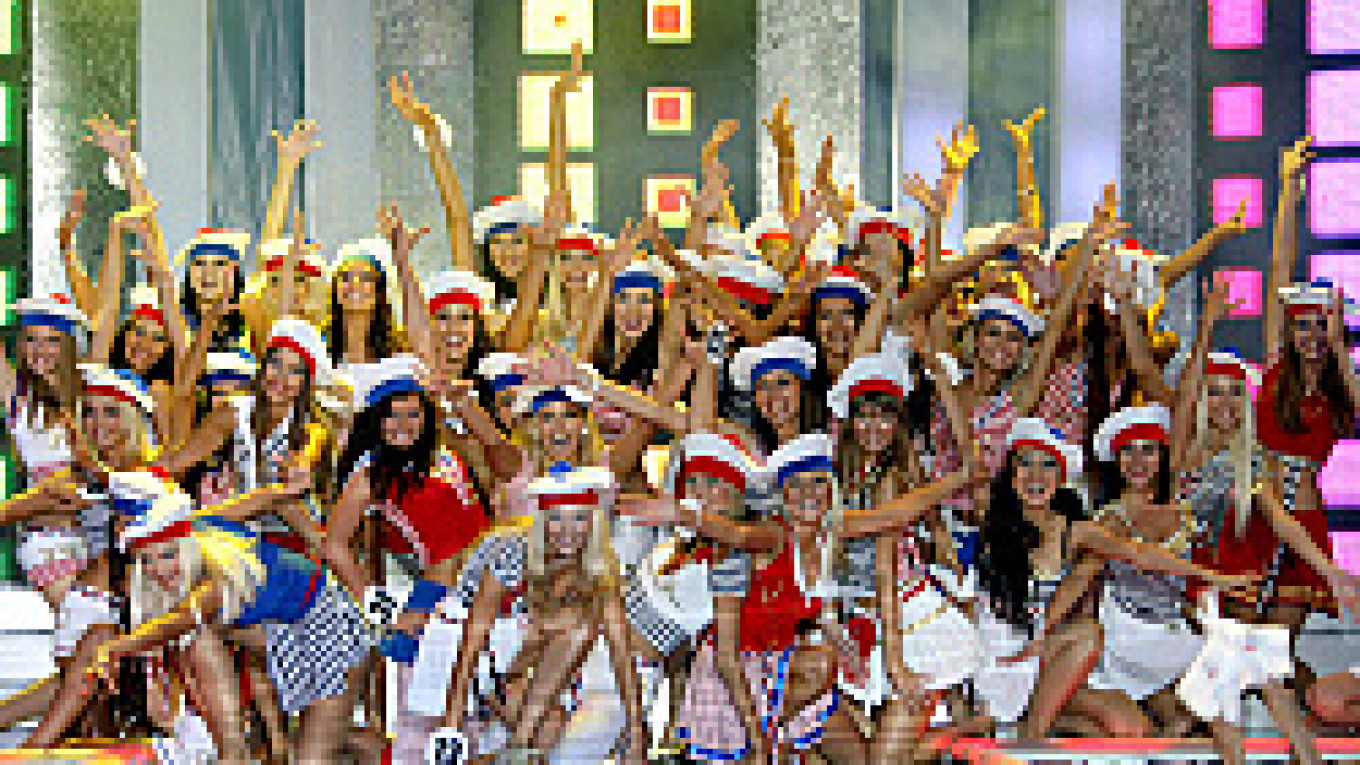Inside the small office sits Yulia Nagayeva, a tall, striking brunette. She is a senior manager for business development at TVEL, a manufacturer of nuclear fuel. She is also Miss Atom, the latest winner of the beauty contest that has been run by Nuclear.ru annually since 2004. Miss Atom is an online contest for girls under the age of 35 who work in the nuclear energy industry.
In addition to the country's oil and mineral wealth, over the past decade Russia has been busy refining another one of its valuable natural resources: beauty. And while there have been no major international wins for Russia since Oksana Fyodorova won Miss Universe in 2002, the numerous domestic competitions ensure that some of Russia's most beautiful girls get to bask in the glow of a spotlight.
"I think it's every girl's dream to see how they compare to other women," Nagayeva said. She had entered the contest twice before she won this year and loves the process of it.
"It's great. We get a stylist who chooses our dresses, a professional hairdresser and a photographer. Then we get photographed in beautiful locations. I really wanted to take part in this," she said.
"Our country is recognized for the beauty of its women," said Tatyana Andreyeva, director of Beauty of Russia (Krasa Rossii), one of the longest-running beauty contests in Russia. "I consider ours one of a very few countries, perhaps even the only country, where female beauty is in the blood, where it is a national resource. Because of this, I feel that beauty contests here are very significant. They glorify these national resources."
"It's not that Russian women are more beautiful than other women," said Fyodorova in a telephone interview. "It's just that Slavic beauty is a universal kind of beauty."
Ilya Platonov, the director of Nuclear.ru, runs his competition for a rather different reason. "When people think of nuclear energy, they get scared, they think of Chernobyl. We want to show that the people working with and promoting nuclear industry are normal and the fact that the industry is filled with lots of beautiful women."
 Vladimir Filonov / MT Yulia Nagayeva is the current Miss Atom, having won an Internet beauty contest for workers in the nuclear energy industry. | |
The winner, Sofia Larina, 20, a student from Siberia, will go on to represent Russia in Miss World.
Preparation for the event involved a tight, 10-day schedule of rehearsals and a strict "no alcohol" and "no boys" policy for the contestants. And while carbohydrates and sweets were not officially prohibited, they were discouraged.
"We don't prohibit bread, but we try to limit it and put it far away so that it's not easy to get," Andreyeva said. "We serve a lot of vegetables, a lot of juice, a lot of liquids and try to get them to do a lot of exercise. Some of the girls still need to lose weight, but, you know, a lot of them are children; they're still growing, and if they want to eat ice cream, there's not much you can do about it," she said before the contest.
As well as rehearsing for their group and individual performances, which included a professional flamenco dancer, an opera singer and a magician, the women also took daily yoga classes.
The classes were taught by Maria Kalinina, queen of the first Moscow Beauty (Moskovskaya Krasavitsa) competition in 1988. Kalinina, an honorary president of Beauty of Russia, lives and runs her own yoga studio in Los Angeles. She is also the president of a school of beauty in Russia called The First School of Aesthetic Development and Completeness, a place where ladies can learn to behave like beauty queens.
"We try to achieve a golden mean between feminism and femininity," said Zina Baldanova, who works for the school, which will open this fall. The courses, which will run for three hours daily, will include classes in stress-management and etiquette.
"We want a woman to be a good wife and housewife, but we also want her to be presentable in public," Baldanova said.
"The daily yoga will not only help the girls deal with the stress of the contest," said Kalinina at a news conference. "It will also help give the girls the confidence they'll need to talk to the media. Often a girl can do well in the beauty part of the competition, but when it comes to talking to the press or on stage she has trouble expressing her thoughts. The yoga helps with that a lot."
The youngest participant this year was 15 years old, and the oldest was 23, although Andreyeva said that women as old as 26 could compete. This year the contest was also open to women who have children but are not married, a unique allowance for many beauty contests.
"Because of the small number of men in our country, there aren't a lot of women who have kids and a full family," Andreyeva explained. "We feel that a woman who has a child but not a husband is no worse than any other woman."
As 2008 is the state-sponsored Year of the Family, this year's Beauty of Russia is dedicated to "developing family priorities, the maternal spirit and female beauty as a national resource."
Although her Miss Universe crown was taken away from her after four months for not completing her duties, beauty has launched Fyodorova's career. She has a television show, "Goodnight, Little Ones," and is also a goodwill ambassador for UNICEF. Soon she will also release a book of beauty advice and style.
A rather different beauty contest has changed the life of another young woman. In 2005, Russia held its first, and so far only, Miss HIV-Positive beauty pageant. The winner of the contest was Svetlana Izambayeva, 24.
While physical appearance played a role in the contest, the focus was more on women who presented a positive outlook on life. "The contest was important not only for providing people with information about HIV, but also for helping the women work through some of their own issues," says Izambayeva, who is married and recently gave birth to an HIV-negative girl.
For the winner, the pageant was one of the most memorable events in her life and a turning point for her activism. Thanks to the contest, she was able to found her own organization, the Svetlana Izambayeva Foundation, which helps HIV-positive women deal with the emotional, psychological and social stress of their illness.
"These kinds of events give people the power to open up, to deal with their self-stigmatization and help other people realize that this can happen to anyone, that people with HIV are regular people, just like them."
A Message from The Moscow Times:
Dear readers,
We are facing unprecedented challenges. Russia's Prosecutor General's Office has designated The Moscow Times as an "undesirable" organization, criminalizing our work and putting our staff at risk of prosecution. This follows our earlier unjust labeling as a "foreign agent."
These actions are direct attempts to silence independent journalism in Russia. The authorities claim our work "discredits the decisions of the Russian leadership." We see things differently: we strive to provide accurate, unbiased reporting on Russia.
We, the journalists of The Moscow Times, refuse to be silenced. But to continue our work, we need your help.
Your support, no matter how small, makes a world of difference. If you can, please support us monthly starting from just $2. It's quick to set up, and every contribution makes a significant impact.
By supporting The Moscow Times, you're defending open, independent journalism in the face of repression. Thank you for standing with us.
Remind me later.


